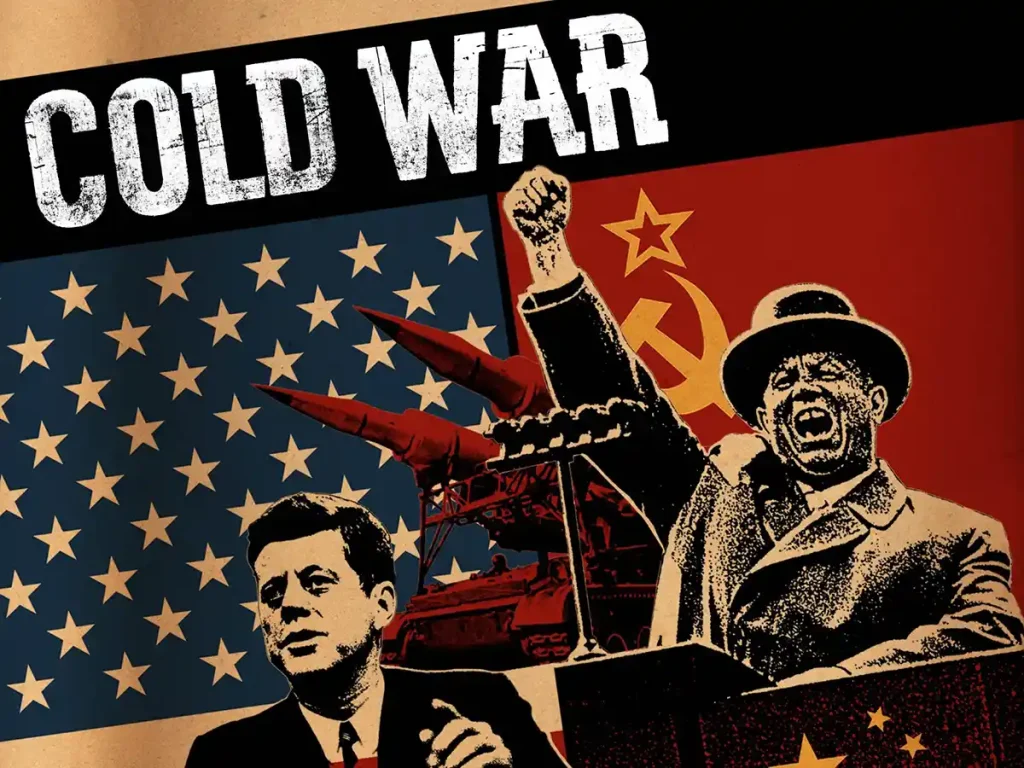Cold War episode 15 – Red Spring: The Sixties – In the Soviet bloc, communist rule stifles ambition and achievement. Soviet defense expenditure cripples economic growth. In the Soviet bloc, the grip of communist rule has long been a suppressive force, stifling ambition and achievement among its citizens. The immense burden of Soviet defense expenditure continues to hinder economic growth, creating an environment that breeds disillusionment. The younger generations, captivated by the alluring symbols of America’s youth culture, yearn for the freedom represented by blue jeans and rock ‘n roll. Within this context, Czechoslovakia witnesses a glimmer of hope under the leadership of Alexander Dubcek, who bravely attempts to implement limited reforms. However, the events of 1968 demonstrate that even these modest changes are not tolerated, as Soviet force mercilessly crushes the progressive movement known as the Prague Spring.
Meanwhile, the Soviet Union itself enters the decade with a renewed sense of openness and optimism. This shift is accompanied by the emergence of a new generation of youth who have no direct memory of the hardships and purges of the past. Instead, they are drawn to Western music and fashion, much to the concern of the established order. Nikita Khrushchev, in his pursuit of a more affluent Soviet consumer economy, embarks on ambitious projects such as housing construction and the poorly organized Virgin Lands Campaign. However, Khrushchev’s erratic leadership style, coupled with his handling of the Cuban Missile Crisis and the impact of a poor harvest in 1963, ultimately leads to his removal from power.
In Czechoslovakia, the transformation under Alexander Dubcek is even more profound, as he boldly introduces human rights and free market reforms. Yet, this hopeful period known as the Prague Spring is met with staunch opposition from Soviet Premier Leonid Brezhnev. The movement is brought to an abrupt and devastating end in 1968, serving as a stark reminder of the limits of reform within the Soviet sphere of influence.
This complex and tumultuous period in history is brought to life through the insights and perspectives of interviewees such as Milos Forman, Vladimir Semichastny, Vasil Bilak, and Yevgeny Yevtushenko. Their firsthand accounts enrich our understanding of the challenges and aspirations that defined this era, offering a vivid glimpse into the struggle for change in the face of oppressive regimes.
Cold War episode 15 – Red Spring: The Sixties
The Prague Spring: A Beacon of Hope in a Dark Era
The Historical Context of the Prague Spring
The Prague Spring, a brief yet significant period of liberalization in Czechoslovakia during the 1960s, emerged as a beacon of hope in a time marked by the oppressive rule of communism. The term “Prague Spring” refers to the events of January to August 1968, when Alexander Dubcek, the First Secretary of the Communist Party of Czechoslovakia, initiated a series of political and economic reforms. These reforms, which aimed to create “socialism with a human face,” were met with resistance from the Soviet Union and ultimately led to a military invasion that extinguished the movement’s flame.
Understanding the historical context of the Prague Spring requires delving into the depths of the Cold War era, a time marked by ideological clashes between the Soviet Union and Western nations. Within the Soviet bloc, communist rule stifled ambition and achievement, and the immense burden of Soviet defense expenditure hindered economic growth. As a result, citizens of these nations, particularly the younger generations, became captivated by the symbols of American youth culture and yearned for the freedoms they represented.
The Reforms and the Unforeseen Consequences
At the helm of this movement for change stood Alexander Dubcek, who took office in January 1968. His proposed reforms sought to grant greater freedom of speech, press, and movement, as well as promote decentralization of economic power. Furthermore, Dubcek aimed to eliminate the coercive methods employed by the Communist Party, creating a more democratic political environment. These ambitious reforms captured the hearts and minds of the Czechoslovakian people, igniting a fervor for change that permeated the nation.
However, Dubcek’s progressive vision was met with staunch opposition from the Soviet Union, led by Premier Leonid Brezhnev. The Soviet leadership viewed these reforms as a direct threat to their hold over the Eastern Bloc countries. In response, they demanded a halt to the reforms and, when negotiations failed, took drastic measures to assert their dominance.
The night of August 20, 1968, saw a swift and brutal invasion of Czechoslovakia by Soviet-led Warsaw Pact forces, marking the tragic end of the Prague Spring. The invasion, which left over 100 citizens dead and thousands more injured, resulted in the reestablishment of a hardline communist regime. Dubcek was removed from power, and the dreams of a more liberal Czechoslovakia were crushed under the weight of Soviet military might.
The Enduring Legacy of the Prague Spring
Despite its tragic conclusion, the Prague Spring left an indelible mark on history, serving as a powerful reminder of the human spirit’s resilience and the desire for freedom that transcends political boundaries. The movement’s legacy can be felt in the eventual collapse of the Soviet Union, as the events of 1968 exposed the cracks within the Eastern Bloc and emboldened other nations to seek change.
The influence of the Prague Spring can also be seen in the cultural realm, as the movement inspired a wealth of artistic expression, including music, literature, and film. These artistic creations not only captured the spirit of the time but also served as a testament to the resilience of the human spirit in the face of adversity.
Furthermore, the Prague Spring has come to symbolize the importance of standing up for one’s beliefs and striving for change, even when faced with seemingly insurmountable odds. The movement serves as a potent reminder that, despite the darkness that may engulf us, the flame of hope can never be fully extinguished.
